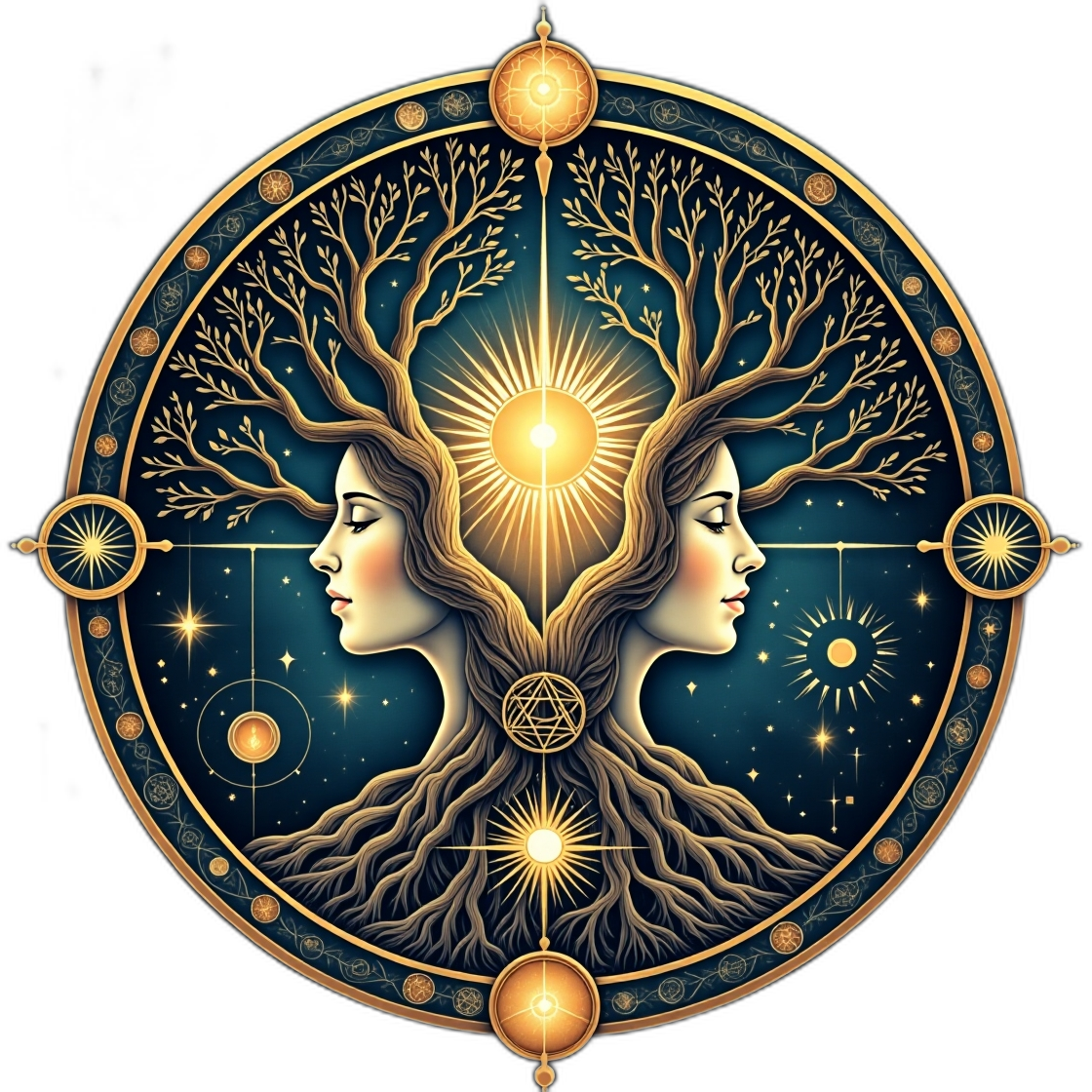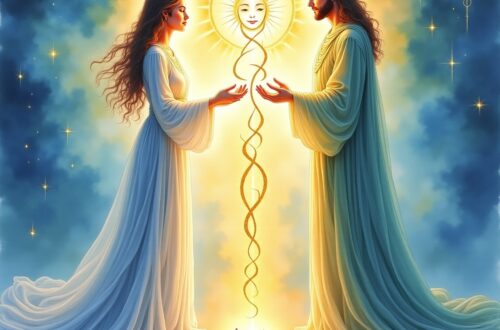
Beyond Sin: Awakening to Our Divine Nature Through Mary’s Gospel
In the heart of forgotten Christian wisdom lies a profound message that may challenge everything we’ve been taught about sin. The journey I’m about to share with you reveals a spiritual perspective that invites us to see ourselves not as inherently flawed beings, but as divine expressions momentarily forgetting our true nature.
The Forgotten Wisdom of Mary Magdalene
Deep within the ancient text known as the Gospel of Mary, we find a striking dialogue between Peter and Jesus that rarely echoes in Sunday sermons:
From The Desk of Archives of Inquiry is a reader-supported publication. To receive new posts and support my work, consider becoming a free or paid subscriber.
Peter said.. “What is the Sin of the World?”
The Savior said, “there is no sin, but it is you who make sin when you do the things that are like the nature of adultery, which is called sin. That is why the Good came into your midst, coming to the good which belongs to every nature in order to restore it to its root. This is why you become sick and die for you love what deceives you. One who understands, let him understand!”[1]
These words reveal something revolutionary about our divine nature. Jesus doesn’t dismiss the reality of harmful actions but reframes our understanding of what sin actually is. Rather than a permanent stain on our souls or an inherited condition, this teaching suggests sin is what happens when we forget our true essence and become entangled in what doesn’t serve our highest expression.
The Gospel of Mary wasn’t included in the canonical Bible, yet it offers us a perspective that speaks directly to the awakening of the divine feminine wisdom that has been suppressed throughout church history. Mary Magdalene’s voice brings balance to our understanding of spirituality-one that emphasizes inner transformation rather than rigid rule-following.
From Original Sin to Original Goodness
Many of us grew up hearing about Original Sin-the idea that we’re born inherently flawed, bearing the mark of Adam and Eve’s disobedience. Augustine’s doctrine teaches that “every baby is bad and you need Baptism in Jesus to wash that original sin right off”[2]. This perspective has shaped Christian theology for centuries, focusing on our brokenness rather than our inherent divine nature.
But what if we’ve been looking through the wrong lens? The Gospel of Mary weaves a different narrative about our fundamental nature. It speaks of God as “The Good” and suggests that humanity carries a spark of this divine goodness within[3]. Jesus is referred to as “The Child of true humanity” rather than the Son of Man-“the image of the divine realm that exists in every person”[4].
This isn’t to say we’re perfect in our expressions. Rather, it acknowledges that our essence is divine, even when our actions don’t reflect this truth. When we act contrary to our divine nature-what traditional teaching calls “sin”-we’re not violating external rules as much as we’re forgetting who we truly are.
The Dance Between Divine and Human Nature
The traditional concept of sin positions us as rule-breakers before an angry deity. The Catholic Catechism defines sin as “an offense against reason, truth, and right conscience; it is failure in genuine love for God and neighbor caused by a perverse attachment to certain goods”[5] This framework emphasizes sin as disobedience to external laws.
In contrast, Mary’s Gospel invites us to see ourselves as divine beings on a journey of remembrance. This perspective doesn’t deny that we cause harm or act selfishly-it simply reframes these actions as forgetting our true nature rather than breaking rules.
“While insisting that no sin exists as such, the Savior goes on to clarify that people do produce sin when they wrongly follow the desires of their material nature instead of nurturing their spiritual selves. He describes this sin as adultery, an illegitimate mixing of one’s true spiritual nature with the lower passions of the material body…like adultery sin joins together what should not be mixed”[6].
This profound shift in perspective moves us from shame to awareness, from punishment to growth, from external judgment to internal alignment. It calls us to recognize when we’ve strayed from our divine essence and gently guides us back home to ourselves.
The Seven Passions vs. The Seven Deadly Sins
Traditional Christian teaching names seven deadly sins-pride, greed, wrath, envy, lust, gluttony, and sloth[7]. These are presented as behaviors to avoid, temptations to resist.
Mary’s Gospel offers a different framework-seven passions that the soul must work through and overcome[8]. This isn’t about avoiding “bad” behaviors but about transforming our consciousness through inner work. It’s about recognizing when we’re deceiving ourselves, when we’re grasping at what doesn’t serve our highest good.
This approach requires “substantial work on yourself” and involves “the soul in debate with passions that derail a person from being their best selves”[9]. It’s what today we might call “ego work”-the challenging but rewarding process of understanding our shadows and bringing them into the light of awareness.
Living Beyond Rules: Jesus’s Final Warning
Perhaps one of the most striking aspects of Jesus’s teaching in Mary’s Gospel is his parting guidance:
“Go then, preach the good news about the Realm. Do not lay down any rule beyond what I determined for you, nor promulgate law like the lawgiver, or else you might be dominated by it.”[10]
This warning feels particularly poignant when we consider how Christianity evolved into an institution often focused on rules and doctrine. Jesus cautions against making more rules, understanding that rigid structures can become prisons that dominate rather than liberate.
The Urban Abbot article reflects: “It’s sort of a great tragedy, to make and enforce rules in Jesus’ name, to put morality on one side and make it such a challenge as our culture grows and changes”[11]. Rules are easier to administer than the deep inner and communal work that Mary’s Gospel calls us to. Yet it’s precisely this inner work that leads to authentic transformation.
Embracing Our Divine Nature in Daily Life
What might our lives look like if we embraced this revolutionary understanding? If we saw ourselves and others not as “sinners” but as divine beings sometimes forgetting our true nature?
This perspective doesn’t mean anything goes-quite the opposite. It calls us to greater responsibility and awareness. When we recognize our divine essence, we naturally want to align our actions with that truth. We move from fear-based morality to love-based ethics.
The Gospel of Mary invites us to:
- Look inward with courage and compassion
- Recognize when we’re acting from our lower nature rather than our divine essence
- Remember that at our core, we are expressions of “The Good”
- Do the challenging work of transformation rather than simply following rules
- Build communities that nurture our divine potential rather than shame our human struggles
Weaving a New Spiritual Fabric
“Let’s reweave that fabric of our tradition, away from seven deadly sins and perhaps into the numerous freedoms that we might find when we are no longer bound by our ego and deceived by our wants”[12].
This invitation from the Urban Abbot article speaks to the heart of spiritual evolution. What would our faith communities look like if we centered this understanding? Perhaps they would be spaces where transformation happens through love rather than fear, where we’re held accountable through compassion rather than punishment, where we celebrate our divine nature even as we work with our human challenges.
Through Mary Magdalene’s forgotten wisdom, we glimpse a Christianity that might have been-and perhaps still could be. One where the divine feminine stands equal with the sacred masculine, where internal transformation balances external action, where we recognize ourselves and each other as expressions of the divine learning to remember who we truly are.
Embracing the Journey Home
The path of “no sin” doesn’t mean no responsibility-it means greater awareness. It doesn’t diminish the impact of harmful actions-it reframes why we cause harm in the first place. We aren’t broken beings needing salvation from our inherent badness; we are divine beings on a journey of remembering our true nature.
This perspective invites us into a different relationship with our spiritual practice. Rather than striving to avoid sin, we’re called to awaken to who we truly are. Rather than fearing divine punishment, we’re invited to recognize how we punish ourselves when we forget our essence. Rather than focusing on rules, we’re encouraged to nurture the divine spark within.
The Gospel of Mary reminds us that the journey isn’t about becoming something we’re not-it’s about remembering who we’ve always been. The divine feminine wisdom speaking through Mary Magdalene calls us home to ourselves, to the sacred truth of our being that transcends all concepts of sin and separation.
May we have the courage to look within, to do the challenging work of transformation, and to recognize the divine light that has been there all along, waiting for us to remember.
Citations:
[1] https://www.urbanabbot.org/worshipandliturgy/7ud0eowpx2jx5d1ptv35yohtxpxmxu
[2] https://www.urbanabbot.org/worshipandliturgy/7ud0eowpx2jx5d1ptv35yohtxpxmxu
[3] https://www.urbanabbot.org/worshipandliturgy/7ud0eowpx2jx5d1ptv35yohtxpxmxu
[4] https://www.urbanabbot.org/worshipandliturgy/7ud0eowpx2jx5d1ptv35yohtxpxmxu
[5] https://www.vatican.va/content/catechism/en/part_three/section_one/chapter_one/article_8/ii_the_definition_of_sin.html
[6] https://www.urbanabbot.org/worshipandliturgy/7ud0eowpx2jx5d1ptv35yohtxpxmxu
[7] https://en.wikipedia.org/wiki/Seven_deadly_sins
[8] https://www.urbanabbot.org/worshipandliturgy/7ud0eowpx2jx5d1ptv35yohtxpxmxu
[9] https://www.urbanabbot.org/worshipandliturgy/7ud0eowpx2jx5d1ptv35yohtxpxmxu
[10] https://www.urbanabbot.org/worshipandliturgy/7ud0eowpx2jx5d1ptv35yohtxpxmxu
[11] https://www.urbanabbot.org/worshipandliturgy/7ud0eowpx2jx5d1ptv35yohtxpxmxu
[12] https://www.urbanabbot.org/worshipandliturgy/7ud0eowpx2jx5d1ptv35yohtxpxmxu




